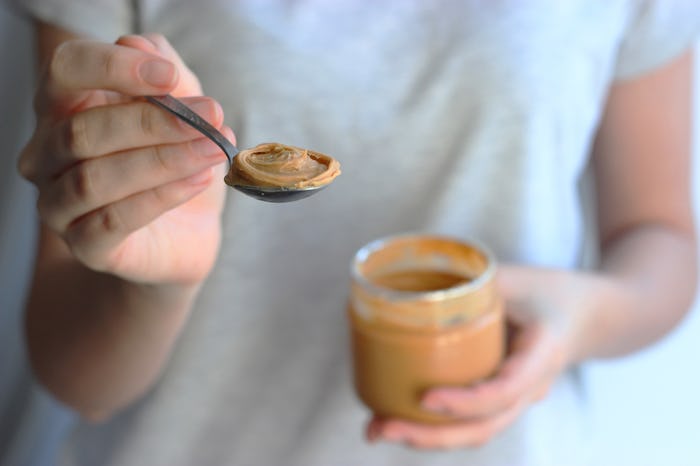Life
Breastfeeding Moms: Your Peanut Butter Obsession Has Benefits For Your Kid, Too
It's no secret that one of the scariest parts of having kids is not knowing what their health concerns will be later on in life. While science is advancing quickly and allowing many parents to be fairly prepared for many health problems that their children may have, not everything is so easily diagnosed. And as so many children these days are being diagnosed with some sort of allergy, it's no wonder that research into the matter has expanded. And now, a study has shown that eating peanuts while breastfeeding may help prevent future allergies in kids — and that's pretty awesome.
The study, which was done with help from the Children’s Hospital Research Institute of Manitoba and the University of Manitoba, found that mothers who ate peanuts while breastfeeding — or who let their children consume peanut products at a young age — were actually working to reduce the likelihood that their child would develop an allergy to peanuts later on.
Aptly titled, "Reduced risk of peanut sensitization following exposure through breast-feeding and early peanut introduction," the study looked at 347 babies born in Vancouver and asked their moms whether they ate peanuts while breastfeeding, or if they gave their kids peanut products, like peanut butter, early on in life.
Then, once the children were 7 years old, "skin prick testing for peanut sensitization was performed," according to the study. According to the results:
At 7 years, 9.4 percent of children were sensitized to peanuts. The lowest incidence (1.7 percent) was observed among children whose mothers consumed peanuts while breast-feeding and directly introduced peanuts before 12 months.
And truly, this study is especially important when peanut allergies have the potential to be deadly, and peanut products are so common. In fact, "between 1997 and 2008, the prevalence of peanut or tree nut allergy appears to have more than tripled in U.S. children," according to Food Allergy Research and Education.
FARE also found that, "About 40 percent of children with food allergies have experienced a severe allergic reaction such as anaphylaxis," which means that having a peanut allergy is literally a life-threatening issue, and if it can be prevented, it should.
Most parents are aware that sending their kids to school often opens up a plethora of possibilities for their kids to get sick or contract some sort of illness. And while vaccines are there to help prevent the spread of serious disease, there aren't really a whole lot of preventable measures for food allergies — including peanuts.
However, this study also found that the best way to prevent peanut allergies in your kids was to eat peanuts while breastfeeding, as well as introduce the legume into their diets at an early age. Per the study:
Maternal peanut consumption while breast-feeding and infant peanut consumption by 12 months were protective in combination, whereas either exposure in isolation was associated with an increased risk of sensitization.
Unfortunately, it seems that the best course of action is to expose your children to peanuts and peanut products in as many ways as possible before they get too old. Of course, this is just one study, so don't go planning your child's entire health regimen around it and be sure to always check with your pediatrician with questions about your kid's diet. But, if the results are indeed true, and true for others not surveyed, then the fine folks over at the Children’s Hospital Research Institute of Manitoba and the University of Manitoba may have solved a huge problem.
So, if you want your kids to be able to avoid the hassle and danger or having a peanut allergy, then go ahead and reach for that jar of Jif, y'all. You might be doing your kid a favor.
Check out Romper's new video series, Romper's Doula Diaries:
